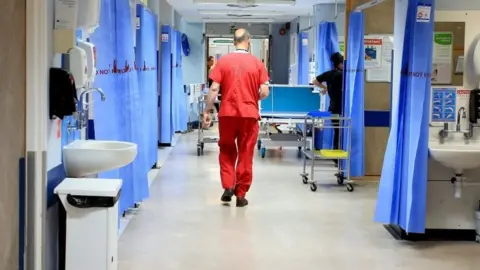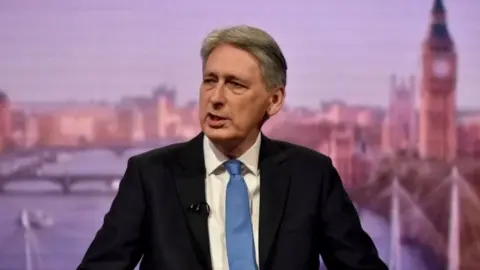Ministers talking about how to get more cash into NHS
 PA
PAThere won't be a red box brandished on the steps of Number 11, a pint won't be up a penny or down a couple, and the chancellor certainly won't have to reach for a stiffener under the despatch box, like some of his predecessors who had a whiskey stashed there for the odd sip or two to get through a marathon Parliamentary statement.
What there also will not be in Philip Hammond's spring statement are grand gestures of new spending; no big cheques being signed by Mr Hammond to portion out your money.
With the balance of the books improving, the chancellor might sound a bit cheerier than at his last big outing.
The public spending numbers appear much healthier than before Christmas.
Unless he undergoes a personality transplant overnight, however, he's hardly going to be chucking money about with abandon.
Expect instead a focus on paying down the debt and taking a "balanced approach" - that's the government's code for carrying on with tight public spending to pay off the public debt.
The argument over the deficit may be over, mostly.
But the government wants now to focus on the debt.

The Hammond case is that we might have cleared the overdraft, but we still have a hefty mortgage that needs to be paid down.
But just because Tuesday's spring statement will be skimpy, it doesn't mean there aren't bigger conversations about the future of the public purse going on.
In fact, senior figures in government have told me there are discussions going on in government about one of the biggest political priorities of all - the NHS.
Several senior sources say that, at the end of January, the cabinet discussed ways of getting more money into the health service in the long term.
That included the foreign secretary's by now familiar argument about the hoped-for but disputed Brexit dividend.
But more intriguingly for a Conservative government, I'm told that the cabinet discussed the possibility of tax rises to fund more spending for the NHS, even a hypothecated tax, as spelled out by senior MPs like Nick Boles.
This does seem to be rather a change of heart.
For months last year, and on the general election trail, the prime minister maintained, time and again, that the NHS has the money that it needs - the funds that it requested.
With the opposition and senior Tories calling for a long-term look at the levels of cash, the line seemed to stay the same.
In January this year, the prime minister repeated that "we have put money in that was asked for in that review, and we've actually put some extra money in, in the spring statement and the Budget last year to deal with this.
"You keep talking about the money but actually what you also need to look at is how the NHS works."
Behind closed doors however, that position is shifting.
One cabinet minister told me "most of us accept now that something has to happen - we have to find a way".
Another said: "It's hard to see how healthcare won't need more money".
A different cabinet minister accepted that "conversations are very live" about the best way to make sure that the NHS is getting what it needs.
There is no consensus in government yet about the right way to go.
Number 10 isn't suddenly about to turn the spending taps on and flood the health service with money.
But at the highest levels of government there is a growing acceptance that the NHS will need more cash, even if the government is far from settling when or how.
